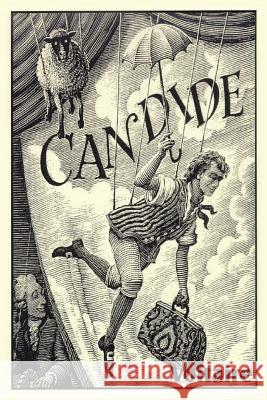Candide » książka
Candide
ISBN-13: 9781612039503 / Angielski / Miękka / 2012 / 106 str.
Candide
ISBN-13: 9781612039503 / Angielski / Miękka / 2012 / 106 str.
(netto: 45,57 VAT: 5%)
Najniższa cena z 30 dni: 47,19
ok. 16-18 dni roboczych.
Darmowa dostawa!
Candide, ou l'Optimisme is a French satire by Voltaire, a philosopher of the Age of Enlightenment. It begins with a young man, Candide, who is living a sheltered life in an Edenic paradise and being indoctrinated with Leibnizian optimism by his mentor, Pangloss. The work describes the abrupt cessation of this lifestyle, followed by Candide's slow, painful disillusionment as he witnesses and experiences great hardships in the world. Voltaire concludes with Candide, if not rejecting optimism outright, advocating an enigmatic precept, "we must cultivate our garden," in lieu of the Leibnizian mantra of Pangloss, "all is for the best in the best of all possible worlds." Voltaire (Francois-Marie Arouet) was a French Enlightenment writer, historian and philosopher famous for his wit and for his advocacy of civil liberties, including freedom of religion, freedom of expression, free trade and separation of church and state. He was a prolific writer, producing works in almost every literary form, including plays, poetry, novels, essays, and historical and scientific works. He wrote more than 20,000 letters and more than 2,000 books and pamphlets."
Candide, ou lOptimisme is a French satire by Voltaire, a philosopher of the Age of Enlightenment. It begins with a young man, Candide, who is living a sheltered life in an Edenic paradise and being indoctrinated with Leibnizian optimism by his mentor, Pangloss. The work describes the abrupt cessation of this lifestyle, followed by Candides slow, painful disillusionment as he witnesses and experiences great hardships in the world. Voltaire concludes with Candide, if not rejecting optimism outright, advocating an enigmatic precept, "we must cultivate our garden", in lieu of the Leibnizian mantra of Pangloss, "all is for the best in the best of all possible worlds".Voltaire (François-Marie Arouet) was a French Enlightenment writer, historian and philosopher famous for his wit and for his advocacy of civil liberties, including freedom of religion, freedom of expression, free trade and separation of church and state. He was a prolific writer, producing works in almost every literary form, including plays, poetry, novels, essays, and historical and scientific works. He wrote more than 20,000 letters and more than 2,000 books and pamphlets.











